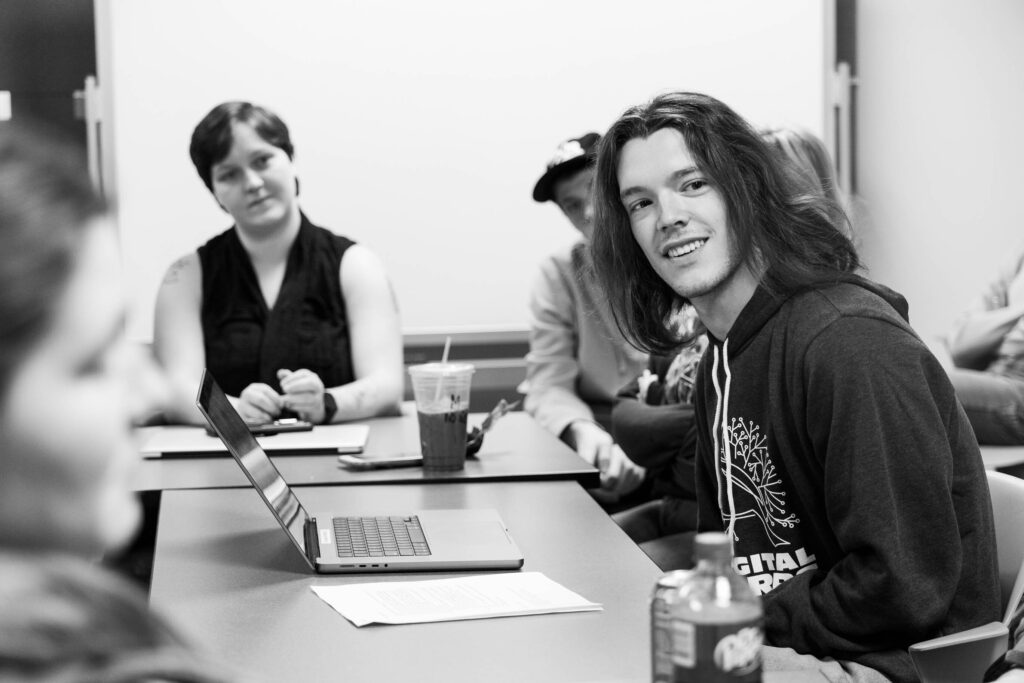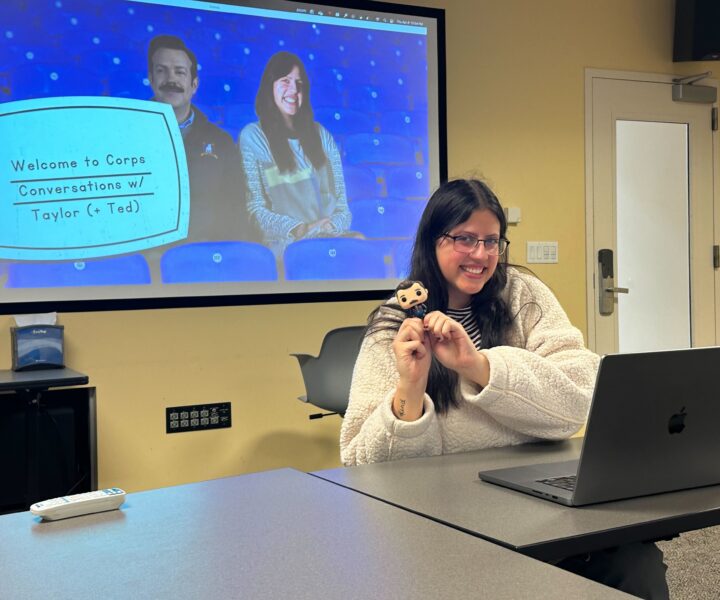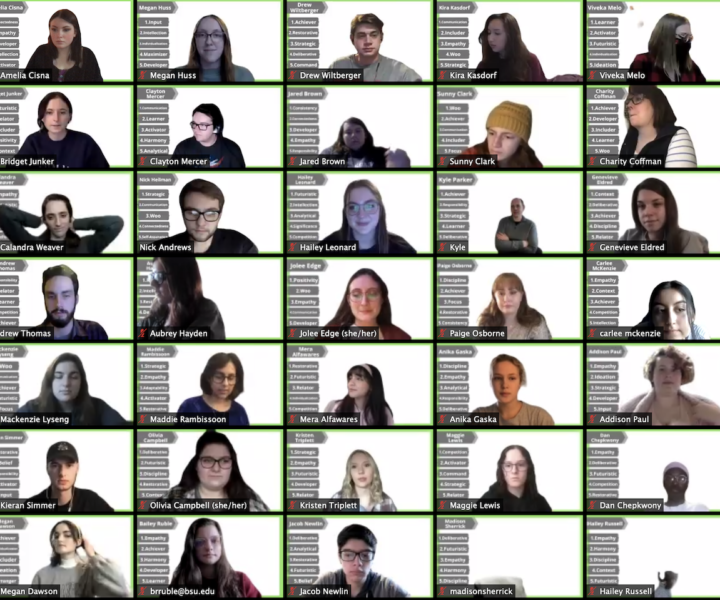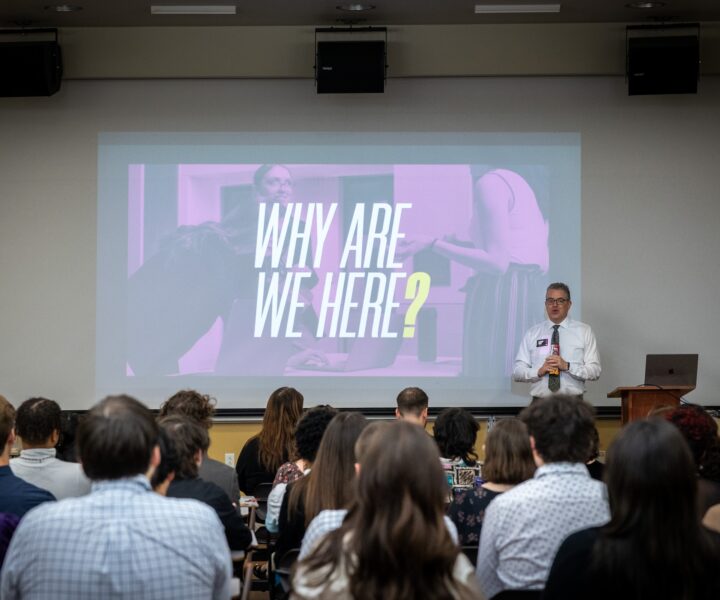
Working at the Corps helps students learn how to balance their life and manage their time effectively.
Balancing it All
What do you value most in your life? To most people, their life at work comes before anything else. I’m usually very aware of what I need to get done each day, maybe even to a fault, as I can waste valuable time worrying about what I need to do instead of actually just getting those tasks finished.
Although it’s obviously important to make sure we’re getting our stuff done, it’s just as important to take care of ourselves. Unfortunately, it’s way too common for people to put their personal health and well-being to the side to complete their tasks.
So how much do you practice work-life balance in your own life? You likely have heard of this term before, but as a quick refresher, Cambridge defines work-life balance as “the amount of time you spend doing your job compared with the amount of time you spend with your family and doing things you enjoy.”
In my own life, work-life balance is something I’ve struggled with for as long as I can remember. This stems more from me not being the best at time management, but they go hand in hand. Even when I was younger, I would put grades and homework above my own well-being. Being in college hasn’t made this any better, as the workload has increased, and it can be hard to stop thinking about class and homework when you live at school.
Putting your basic needs on hold isn’t a healthy way to deal with a heavy workload and can actually lower the quality of your work! By taking better care of ourselves, we can do even better in our work, and feel good about doing it.
Poor management of your time can have negative effects down the line. As stated by Forbes,“Maintaining work-life balance helps reduce stress and helps prevent burnout in the workplace. Chronic stress is one of the most common health issues in the workplace. It can lead to physical consequences…and impact mental health.” Not feeling like you have enough time to get things done can be a huge source of stress and anxiety. I don’t know about you, but those are two things I really don’t want any more of.
Setting Healthy Boundaries
A big cause of issues with work-life balance is the inability to separate the two. When you’re at work, your mind can wander and distract you by making you worry about things in your personal life you need to address. How can you be expected to focus during a test when you are still trying to figure out weekend plans? Or how will you be able to pay attention during a lecture when all you can think about is family drama? It’s hard to stop thinking about whatever it is that is causing you the most stress.
In the same way, you can go home after a long day of work and be unable to relax as work stuff plagues your mind. Winding down may seem impossible when all you can think about is the deadline you didn’t meet, or the issue you forgot to bring up during an earlier meeting.
To lessen these effects, you need to make sure you’re setting yourself up for success. When you leave your place of work, it’s time for you to stop thinking about your job and focus on your personal life. Your top priority should be taking care of yourself and tending to your personal goals, so eliminate any thought processes or reminders that make you think about work. After all, work isn’t the only place that you have obligations.
Video Apprentice Kyla Anderson has had her own experiences with not putting herself first, as a result of her strong work ethic and desire to get things done. “Sometimes I get a little too invested in my work and put it above other things, which definitely can make things more stressful.”

“Focus on you and listen to yourself when you need something. Don’t put work over yourself. You’ll be more diligent in your work if you take care of yourself.”
At the Corps
At the Digital Corps, work-life balance comes up pretty often. For many students, working at the Corps is the first time they’ve had to balance a job with school. That, along with any clubs, organizations, or groups they may be involved in, can quickly lead to a very packed schedule. If a student isn’t equipped with the tools to manage all of these responsibilities, disaster can strike.
Thankfully, we have each other. At our office, students can host “Corps Conversations,” which is an opportunity for students to have a group conversation about a certain topic, like industry awareness, niche interests, and workplace culture. Last semester, Development Specialist Peyton Schaefer put on a Corps Conversation about work-life balance, where students at the Corps were able to talk about common struggles and share tips on ways to improve.
Schaefer’s interest in the topic came from his own experiences with balancing work with life. “I wanted to pick a topic that matters. Personally, work-life balance is something I felt like I needed to be better at. I felt that by doing this topic and planning things out, I could do others a lot of good, and do myself a lot of good.”
Having a sense of community can be super beneficial when it comes to solving any issue. Hearing others describe their similar problems can help you feel less isolated in your struggles. You are also more likely to ask for help if you know you aren’t alone. No one wants to struggle in silence, and people are generally more willing to offer help than you give them credit for! Try using every resource you can to make the load on your back feel less heavy.

“Think about what your priorities are right now. Think about where you want that balance to be. Figure out how important your work life and personal life are to you, and once you know that, you can make the changes you need to balance the two.”
Best Practices
So, we established how important it is to practice work-life balance, but where do you start? Well, it’s kind of a tough question to answer. We all have different personality types and have a different process for getting work done.
In general, planning out your time can be helpful, even if planning ahead isn’t your style. Just having a general outline of what you want to get done can be valuable. For User Experience Apprentice Angeles Marin, this strategy is her go-to. “Allocate specific timeslots throughout your day to get tasks accomplished and hold yourself accountable. But also make sure to plan out times for you to relax.” Self-care and relaxation are very important, no matter what that looks like for you. Take time to do things you enjoy.

“Work-life balance is a healthy thing to practice. It’s a good way to make sure you don’t overwhelm yourself.”
You should also be aware of the signs that you’re overwhelmed or stressed. If you start to feel burnout, address it instead of ignoring it. As this article from Indeed states, “Feelings of stress and fatigue can signify that you want to change how you maintain your professional and personal balance.” When you feel stressed out, maybe it’s time for an adjustment.
All this information doesn’t mean that your work life doesn’t matter; it most definitely does. You just need to make sure you are doing the small things each day to keep yourself stress-free. Remember, you can only put in your best work if you are feeling up to it, and you have the ability to set yourself up to succeed.



